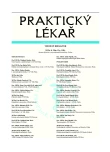Previously expressed wishes or about human freedom and dignity
Authors:
J. Heřmanová 1; J. Šimek 2
Authors‘ workplace:
Univerzita Karlova Praha, 3. lékařská fakulta
Ústav ošetřovatelství
Přednostka: Mgr. Hana Svobodová
1; Jihočeská univerzita České Budějovice, Zdravotně sociální fakulta
Katedra filozofie a etiky v pomáhajících profesích
Vedoucí: doc. MUDr. Jiří Šimek, CSc.
2
Published in:
Prakt. Lék. 2009; 89(9): 480-482
Category:
Reviews
Overview
In current medical practice a patient is viewed as a competent person able to participate on the health care decision-making and determine his or her own future. This idea is based on the respect for autonomy, which stems from the belief in human dignity. Today, the right to self-determination is being considered also in relation to patients who are not able to express their wishes for example due to the permanent vegetative state. Advance directives, which, to some degree, can help patients with decision-making, have been used in USA since 1969. The documents have developed from general, vague proclamations to very detailed instructions addressed to health care professionals and the relatives of the patient. Advance directives have been introduced in several European countries, and the recommendation to take into consideration the patient’s previously expressed wishes is implemented in the Convention on Human Rights and Biomedicine. Previously expressed wishes (advance directives) are mentioned in the new law on providing healthcare services that has been prepared by the Czech Ministry of Health. If the law is approved the Czech patients will be able to express their wishes about future health care. For the advance directives to work though, it is important that there be a sound balance between the patient’s wishes and the conscience of the doctor.
Key words:
dignity, freedom, human rights, conscience, previously expressed wishes
Sources
1. Kant, I. Základy metafyziky mravů. Praha: Svoboda, 1990, 129 s. ISBN 80-205-0152-5.
2. Kastenbaum, R.J. Death, Society and Human Experience. 8th Edition. Boston: Pearson Education Inc., 2004. 535 p. ISBN 0-205-38193-6.
3. Locke, J. Two Treatises of Government. 6th reprint. London: Hollis, 1764. 416 s.
4. Pico della Mirandola, G. O důstojnosti člověka. Praha: Oikoymenh, 2005, p. 135. ISBN 80-7298-164-1.
5. Singer, P. All Animals are Equal. In: Regan,T., Singer, P. (eds.). Animal rights and human obligations. New Jersey: Prentice-Hall, 1989, p. 148-162.
6. Aging with dignity. Five wishes [on-line]. Dostupný na http://www.agingwithdignity.org/five-wishes.php.
7. Ministerstvo zdravotnictví ČR. Návrh zákona o zdravotních službách [on-line]. Dostupný na http://www.mzcr.cz/Odbornik/Pages/720-navrh-zakona-o-zdravotnich-sluzbach-a-podminkach-jejich-poskytovani.html.
Labels
General practitioner for children and adolescents General practitioner for adultsArticle was published in
General Practitioner

2009 Issue 9
- Advances in the Treatment of Myasthenia Gravis on the Horizon
- Hope Awakens with Early Diagnosis of Parkinson's Disease Based on Skin Odor
- Memantine in Dementia Therapy – Current Findings and Possible Future Applications
- Memantine Eases Daily Life for Patients and Caregivers
- Possibilities of Using Metamizole in the Treatment of Acute Primary Headaches
-
All articles in this issue
- Burn out syndrome and assessment doctors
- Depression and anxiety in pregnant women
- Concept of discipline General Practice
- Previously expressed wishes or about human freedom and dignity
- Echocardiography and anticoagulation treatment of patients with cardioembolic stroke
- Dementia in a general practitioner‘s office
- Deliberate self-harm – a serious symptom and dangerous social phenomenon
- A comparison of the lifestyles of young healthy women with different smoking behaviours
- General Practitioner
- Journal archive
- Current issue
- About the journal
Most read in this issue
- Depression and anxiety in pregnant women
- Deliberate self-harm – a serious symptom and dangerous social phenomenon
- Dementia in a general practitioner‘s office
- Echocardiography and anticoagulation treatment of patients with cardioembolic stroke
